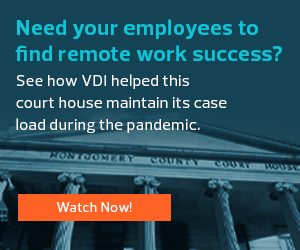CIO Office Supports Teleworkers Providing Critical Citizen Services
The county CIO’s office developed a strong working relations with Montgomery County Domestic Relations to anticipate the division’s needs, Colantuno says. The CIO staff works to resolve any tech challenges quickly.
“A perfect example of that is that we have a customer service unit, and it’s all phone operated. Trying to get that up and running for our remote workers was quite the challenge, and that happened last summer. It was probably the biggest challenge we faced to get our entire office up and running remotely,” Colantuno says.
She adds, “The CIO has been absolutely tremendous with what we’ve needed, technologywise. We have actual desk phones that our employees are able to use at home now. It’s as if they have the office with them.”
Critically, teleworkers also can access a VMware VDI solution, which provides them with all of the applications they require to do their work. “Without VDI, child services could not establish a case and enforce orders in a timely fashion,” Colantuno says.
“Without having the laptops and having the equipment for our individual employees, and without access to VDI, we would not be able to provide the public with the opportunity to establish support, to have those orders enforced so that the children are getting the funds and the money that they deserve and that they need in order to operate in such a time. It’s a very difficult economic time,” she says.
MORE FROM STATETECH: Explore how AI can help states manage an unemployment crisis.
Increased Citizen Participation Follows Virtual Operations
The pandemic knocked many people out of work, producing new challenges for Montgomery County Domestic Relations, which enforces child support orders. The county saw record unemployment in 2020 due to the pandemic.
“We attach unemployment benefits for the payment of support, and the amount of unemployment funds we’ve received in 2020 is a record in the 17 years I’ve worked with domestic relations. We’ve never received that number of funds from unemployment benefits,” Colantuno says.
As a result, some parents weren’t able to pay in support of original orders, and the county domestic relations office convenes conferences to evaluate how to move forward. Sometimes, it modifies child support orders to provide relief.
“We’ve been able to facilitate that and be that intermediary in a very difficult economic situation between parties,” Colantuno says. “You’re dealing with children, you’re dealing with families, you’re dealing with livelihoods. We have been able to address these issues with clients on a timely basis so they’re not having to wait months. That has been absolutely vital.”
With remote work tools, Montgomery County Domestic Relations also has been able to reach and to help even more people than before, she says. The office receives more documentation now than it did when it met clients face to face.
“It’s been a great opportunity for the public to actually participate more. They’re participating more now than they did when we would have the office open,” Colantuno says. “It’s easier when people do not have to take a day off of work or to find child care. They can be available for a phone call or Zoom hearing. And without the CIO and all that they’ve been able to do to get us up and running, we wouldn’t be able to do that for our clients.”











